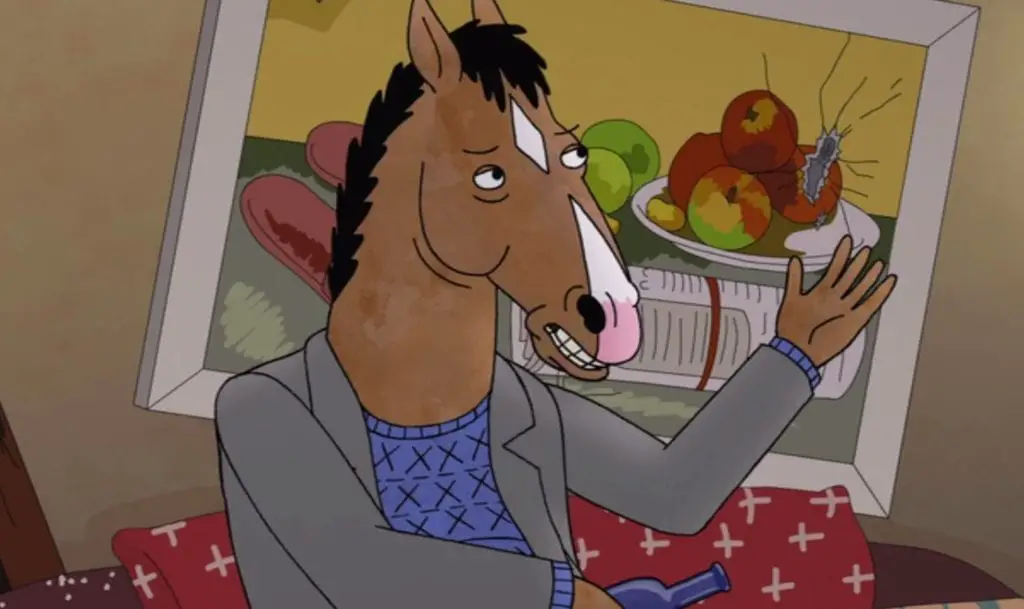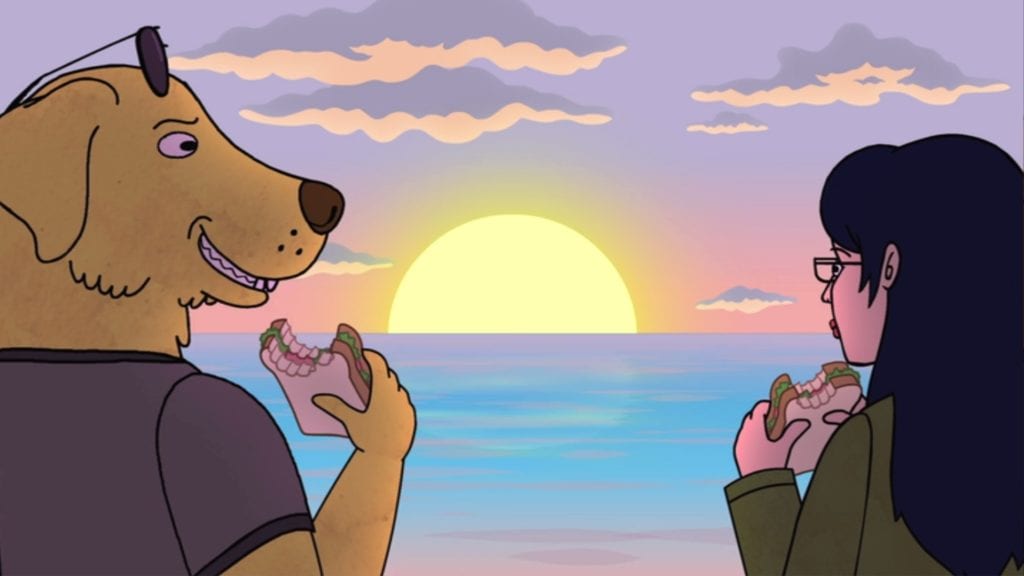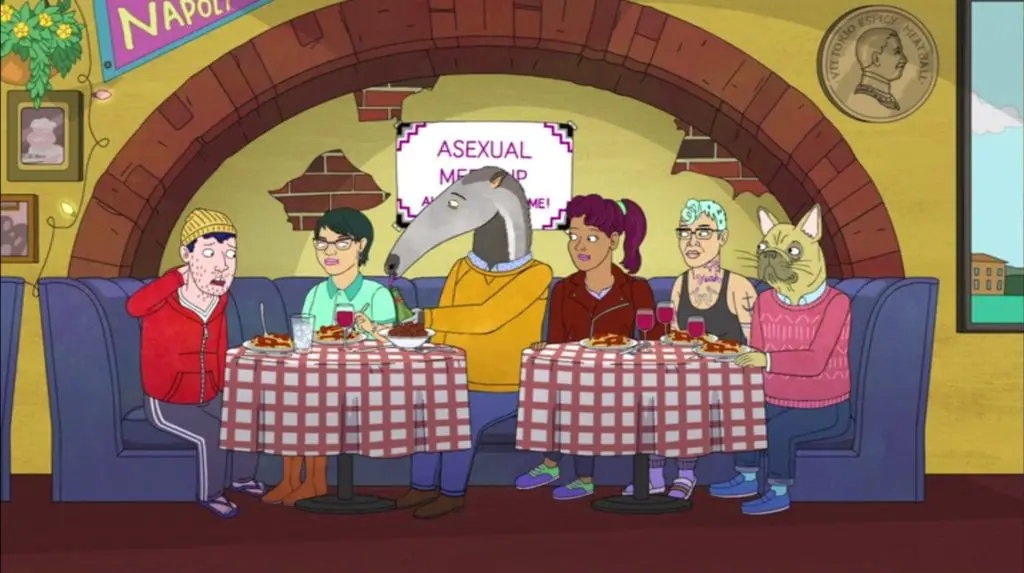Mr. Horseman is finally back and I couldn’t be happier. Netflix finally released the much anticipated fourth season of its whimsical-worlded cartoon that features anthropomorphic animals living alongside humans in Los Angeles. BoJack Horseman’s third year left us wondering whether our protagonist would just give up everything in order to become a field-running careless horse and we got our answers this weekend, so let’s dive right on what was an excellent fourth installment.
Unlike previous reviews, I’m going to try my best and not spoil the smallest details and jokes. However, a mild spoiler alert is still at play here as I reveal select plot points and endgames.
A Horseman With No Name
It is not until the second episode that BoJack (BJ) gets the spotlight. We see that he ended up on the road towards Michigan where he stayed for a year at the house his mother’s family owned — in fact, BJ’s mother’s role has never bigger. When he finally returns to his Hollywood mansion the other big loose thread comes up: his daughter, Hollyhock. Against all odds, BJ tries his best to become a good parent in his own way as he helps her look for her mother. The two strike some incredibly genuine and heartfelt moments that highlight the show’s high-quality dramatic writing.
Another presence in their lives is BJ’s mother, Beatrice, who makes a comeback after Hollyrock expresses her wish to meet her. Turns out Beatrice is suffering from dementia and can’t really recognize BJ anymore, calling him “Henrietta”, and taking away the potential for BJ to tell her how much he hates her guts. It is then that we get the full scope of Beatrice’s life thanks to two flashback-full episodes detailing her adventures: we learn that her brother’s death changed the familial dynamics she knew which propelled her mother to be lobotomized. Eventually, Beatrice eloped with Butterscotch Horseman and resumed a life full of displeasures, becoming the figure of bitterness BoJack knows and hates.
As much as we are sort of used to BoJack’s “shitty” personality, this season gave us something fresh to deal with; it was frankly hard the way he handles and mishandles her mother’s dementia. It’s obviously very sad when someone you love, like your parents, start suffering from Alzheimer’s, but the show puts its claws in an impossible situation where we know for a fact that Beatrice is not a good person and neglected to give BJ the love he needed as a kid, but her condition makes her fragile and child-like…so how to feel about it? Do we actually cheer on BoJack being mean even if he later regrets it and tries to make it better? In the end, BoJack chose a path of kindness despite not fulfilling his wish to tell his mom to fuck off.
I don’t want to spoil the actual outcome of BoJack’s/Hollyrock’s/Beatrice’s arcs for the season, but I do want to say that it ended on an actual nice and hopeful note, contrasting last year’s finale where everything had gone to absolute shit. Bojack Horseman’s fourth season gave BoJack a modicum of a “break”, allowing him to allegedly grow as a *horseperson* and it feels really good to see such a self-loathing character breathe even if it’s just for a little while.
No-Win Nguyen & Bitter Peanutbutter
Season four also served great moments for Diane and Mr. Peanutbutter as much as their arc ended up taking heat. It’s quite obvious that the race for the government position also served as a jab at current world politics in which a declared entertainment person starts a political campaign without ever having served in office before. Mr. Peanutbutter’s aloof and likable personality kept him from taking a stand on the issues which, as much as it became a running joke, it also propelled conflict between the couple.
Diane, on the other hand, has always been a very opinionated person and has, therefore, been the bridge between the show and real life issues: in the past she has spoken about refugees, Cosby-like sexual scandals, patriarchy, misogyny, and abortion; this time, she engages in fracking and gun control with mild-to-good results. It’s in this hour that the show appears to “mock progressiveness” instead of the usual promotion it excels at.
Don’t get me wrong: I absolutely think that both the creative team and the show itself are extremely progressive. However, much like what they did with abortion last season, the resolve to the gun control issue becomes a too much even by Bojack Horseman‘s standards? In fact, it reminded me of the “casual -isms” the flashbacks contain. For example, in one of Beatrice’s episodes, BoJack’s grandfather makes a few sexist comments (“She just let her womanly emotions get the better of her”) and a throwaway line sort of blaming his son’s death, which happened as he fought Nazis during the war, on Jewish people for “peeving off Hitler so bad”. These “jokes” may sound 1950-appropriate on the surface, but they stick out like a sore thumb on the show even if they are allegedly meant to be taken as self-aware satire.
Maybe the show’s resolve hit me a bit hard with Diane saying that America hates women more than it loves guns and while I do appreciate this sardonic sensible gun legislation, it still felt odd upon my first watch. So, not to spoil a lot, but basically, Diane starts being pro-gun-ownership by women as she starts to feel safer like a man would without one and, yes, this is an actual valid hypothesis/statement and the show’s writing goes a long way to make this point. However, the end of this side plot about mass gun shootings dictates that California’s politicians preferred to ban all gun ownership rather than make streets safer for women. It’s hard to explain how this sounds 100% accurate and 100% convoluted at the same time, but perhaps that’s exactly how the writers wanted the audience to feel.

A Cat and Her Catbernet
As she let go of her life as an agent and begins a career as a manager, things seemed to finally be looking up for Princess Carolyn (PC). This season sees her navigating through a nice relationship with the mouse Ralph which gets her in a severely-downplayed version of Get Out while the couple struggles to get pregnant. As usual, one of my favorite episodes this season is the designated PC one which is basically “Princess Carolyn’s Terrible, Horrible, No Good, Very Bad Day”, but from a relatively optimistic perspective.

On a more spoilery note for this paragraph, it is quite sad that PC’s relationship doesn’t quite make it to the end of the season and it is even sadder to think it’s because of her self-destructive behavior as she lied to Ralph about not having had another miscarriage. Her drinking intensifies, but she lands back on her feet, as she often does, to end the season producing another show starring BoJack; this time, however, it’s serendipitously personal to her, and it’s extremely nice to see her happy.
Hooray! Todd’s Character Arc!
Everybody ready to gush? Okay. Let’s gush about factual and directly named asexual representation because, apart from Todd’s side whimsical adventures, he directly addressed his asexuality! Initially, he wasn’t so keen on putting a label on himself, but as time went on, he became more comfortable, went to support meetings, and might just engage with another asexual character.
Keeping the usual going on, though, Todd remained the optimistic adventurous character whose side plot end up influencing the main plot in some incredibly convoluted way and, once again, it’s hilarious to watch. This time, not only he had to pretend to be Courtney Portnoy’s fake boyfriend for a publicity stunt, but he also had a brief moment as governor, became a fashion icon and an entrepreneur creating two businesses.
Random Thoughts
- A huge shout out to Amy Sedaris who crushed the voice-acting for Princess Carolyn’s crying scene. In fact, the writer’s increasingly worrisome addiction to creating increasingly convoluted tongue twisters conceived situations for Amy Sedaris and additional actors to dictate distinctly difficult adages with dramatic and dazzling diction.
- Speaking of voice actors, I love how they get Alison Brie to not only do her work for Diane Nguyen but also other 525,600 additional voices, like damn, she works a lot!
- Fucking hell, I love this show’s running gags and humor. The effort they put into sight gags and things you have to pause to read is amazing — it’s literally everywhere on billboards, book titles, brands, movie posters… I love how self-referential the show has also become with its callbacks to teleprompter writer Randy, the woman who lost her face on a movie set, Mr. Peanutbutter’s Erica, Halloween on January, and etc. One of my favorites this time were the posters for the movie “Uncle Cuck” and its spin-off/sequel “Son of Uncle Cuck”.
- I also love how they structured the episodes this season. I mean, every season has its special/designated character’s episodes, but season four managed a great balance, giving a lot of time for the other characters who are not named BoJack Horseman — hell, episode three is literally called “Hooray! Todd Episode”
- Oh, and finally: if you are wondering what may have happened to beloved character actress Margo Martindale, here’s a little something:





